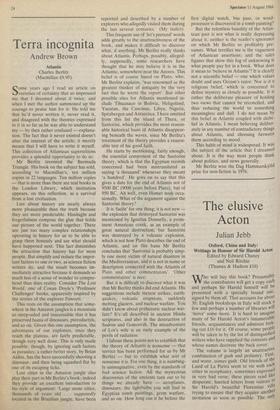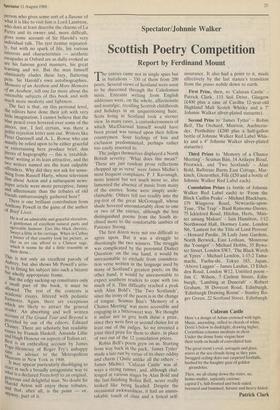The elusive Acton
Julian Jebb
Oxford, China and Italy: Writings in Honour of Sir Harold Acton Edited by Edward Chaney and Neil Ritchie (Thames & Hudson £18)
Who will buy this book? Presumably the contributors will get a copy each and perhaps Sir Harold himself will be presented with a specially bound one signed by them all. That accounts for about 30; English bookshops in Italy will stocka few and perhaps a number of libraries will 'move' some more. It is hard to imagine many of Sir Harold Acton's innumerable friends, acquaintances and admirers fork- ing out £18 for it. Of course, some people will be taken in by the list of distinguished writers who have supplied the contents and whose names decorate the back cover.
The volume is largely an unattractive combination of gush and pedantry. First, and worst, comes gush. Old friends of the Laird of La Pietra seem to vie with each other in sycophancy, sometimes expressed in very bad verse; these pieces read like desperate, hurried letters from visitors to Sir Harold's beautiful Florentine villa trying to ensure that they acquire another invitation as soon as possible. The only person who gives some sort of a flavour of what it is like to visit him is Lord Lambton, who does at least describe the charms of La Pietra and its owner and, more difficult, gives some account of Sir Harold's very individual talk. The rest itemise repeated- IY, but with no spark of life, his various interests and characteristics — aesthetic escapades at Oxford are as dully evoked as are his famous good manners, his great learning and wit. But the man himself obstinately eludes these lazy, flattering Pens. Sir Harold's own autobiographies, Memoirs of an Aesthete and More Memoirs of an Aesthete, tell one far more about the ostensible subjects of this book and with much more modesty and lightness. The fact is that, on this personal level, the editors have done their job with very little imagination. I cannot believe that the blue pencil even hovered over some of the pieces, nor, I feel certain, was there a Polite rejection letter sent out. Writers like Peter Quennell and A. L. Rowse who can usually be relied upon to be either graceful 0r entertaining here produce brief, dim Pieces of hagiography — this is 'establish- ment' writing at its least attractive, and the two writers named are the least culpable offenders. Why did they not ask for some- thing from Russell Harty, whose television film about Acton and a subsequent news- paper article were more perceptive, funny and affectionate than the tributes of old friends embarrassingly gathered here? There is one brilliant contribution from Anthony Powell in the guise of the author of Brief Lives: He is of an admirable and graceful elocution, a gentleman of excellent natural parts and agreeable humour. Eies like black cherries. Sways a little in his carriage. When in Cathay a limner of that country took his picture, as like as art can afford to a Chinese sage, which it seems he did a little resemble in their dress... This is not only an excellent parody of Aubrey, but also shows Mr Powell's anis- ,`I'Y in fitting his subject into such a bizarre out wholly appropriate frame. But the edgy sucking-up constitutes only %small part of the book, it must be allowed. The rest of the contents is ,.academic essays, littered with pedantic fotnotes. Again, there are exceptions which are likely to attract the general reader. An absorbing and well written account of The Grand Tour and Beyond is Provided by one of the editors, Edward Chaney. There are scholarly but readable essays by Francis Haskell, Amanda Lillie alPd Hugh Honour on aspects of Italian art. 'est is an enthralling account by James 't°Pe-Hennessy of Roger Fry's unhappy 2.10e as adviser to the Metropolitan museum in New York in 1908. r It may appear particularly disobliging to what is a declared Festschrift to an original, generous and delightful man. No doubt Sir Harold Acton will enjoy these tributes, and that, after all, is the point — or, anYwaY, part of it.







































 Previous page
Previous page